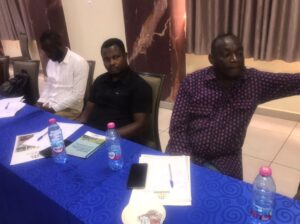The Executive Director for Wacam, Mr Daniel Owusu-Koranteng, has called on the Civil Society Organisations (CSOs) in the mining sector to collaborate with the media to speak against negative issues happening in the mining sector. “The fact of the matter is that these multinational mining companies are very powerful and can even unmake government’s”.

He made this known at a Forum on human rights and Environmental concerns in the mining sector organised by Wacam, with financial support from Oxfam in Ghana, under the Fair4All Programme, held in Accra.
The occasion was also used to share WACAM findings on the protection of the right of children in host mining community and on mining induced Displacement impact on Children’s Education.
Mining has been a part of Ghana’s economy for centuries, with the earliest known mines dating back to the 14th century.
Gold mining, has been a major driver of Ghana’s economy since the colonial period, with large-scale mining operations beginning in the late 19th century.

Mr. Koranteng noted that, even though there are positives associated with mining, the negative include right violations and abuses being perpetuated in the mining communities.
“As Journalists, don’t be deterred when our governments are not ensuring that the right things are done in the extractive sector, but continue to play your advocacy role,” he urged.
He therefore, entreated the media to use their platforms to propagate issues in the mining sector.

Dr. Yaw Asamoah, a Lecturer at the Geography Department of the University of Education, Winneba (UEW) in a Lecturer at the Geography Department of the University of Education, Winneba (UEW) presentation on the outcome of a study “Mining-Induced Displacement’s Impact On Children’s Education: Children Of School-Going Age In Newmont’s ‘Fenceline Communities” in the Asutifi North District (AND) revealed that, several communities within the area have been impacted by Newmont Ghana Gold Limited (NGHL) operations.
Among the study objectives was to investigate the impact of NGGL mining resettlement exercise on the education of children of school-going age in the fenceline communities in the Asutifi North District (AND).

The specifics objectives was to: investigate on how school-going children in the fenceline communities commute to and from school
Analyse the challenges associated with the means of commuting to and from school by the school-going children in the fenceline communities;
Assess the perceived impacts of the means of commuting to and from school on the education of school-going children in terms of enrolment, attendance, retention, punctuality, and performance.
It emerged that, the school children don’t even eat before going to school because they are afraid the bus might leave before they get to the roadside, and sometimes even their pocket money might not be enough for them.
Dr. Asamoah, pointed out that, “fenceline or left behind communities” are those communities around NGGL’s concession in the Asutifi North District, were unable to relocate due to socio-economic factors.
The research investigated on how school-going children in the fenceline communities commute to and from school, and analysed challenges associated with the means of accessing school.

The report findings indicated that, close to 10,000 people (in 1,701 households) in 10 communities directly affected with “physical” (5,185 people in 823 households) or “economic” (4,390 people in 878 households) displacement” by NGGL operations – Kodiwohia & Kwakyekrom (Alliance Planning, 2005).
The report further revealed that, the displacement has resulted in the demolition of some public schools including, 1 Local Authority (L/A) primary school (established in 1991), 58 pupils at Kwakyekrom, 3 other L/A schools – a kindergarten, a primary school (established in 1984),1 junior secondary school (established in 2002) at Kodiwohia, 190 pupils.

Other findings outlined has to do with high school dropouts, low enrollment and attendance and poor academic performance as some of the challenges in the fenceline communities.
